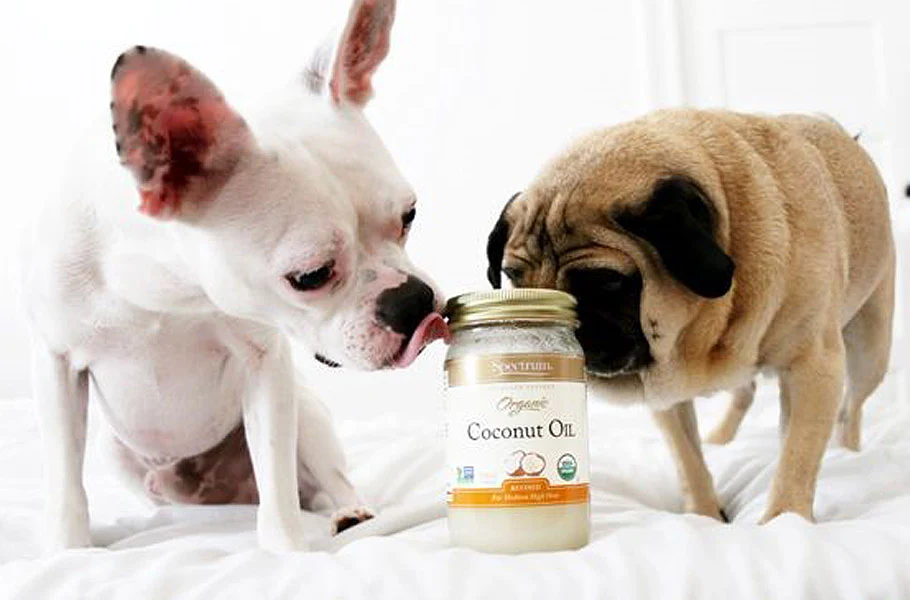Coconut oil has become increasingly popular in recent years, touted for its potential health benefits for both humans and pets. But is coconut oil safe for dogs?
And can it really offer the same health advantages for our furry companions as it does for us?

Let’s take a closer look at the nutritional benefits of coconut oil and how it can be safely used to improve your dog’s overall well-being.
Is Coconut Oil Safe for Dogs?
Yes, coconut oil is generally safe for dogs when used in moderation. Many dog owners use it as a supplement to improve their dog’s skin, coat, digestion, and even energy levels.
However, as with any supplement or food, it’s important to introduce it slowly and monitor how your dog responds.
Nutrients in Coconut Oil and Their Benefits for Dogs
Coconut oil is packed with healthy fats and essential nutrients that can positively impact your dog’s health. Here’s a breakdown of some key components:
- Medium-Chain Triglycerides (MCTs): One of the primary reasons coconut oil is celebrated for health benefits is due to its high content of MCTs. These fatty acids, particularly lauric acid, have antibacterial, antiviral, and antifungal properties. MCTs are easily digestible and provide a quick source of energy, which can be particularly useful for active or senior dogs who may need a little extra boost.
- Lauric Acid: This type of MCT is known for its antimicrobial properties, which can help fight off bacteria, viruses, and yeast infections. It can also promote a healthy immune system and support heart health in dogs.
- Caprylic and Capric Acid: Both of these acids are known for their anti-inflammatory properties and their ability to fight off infections. These elements can be particularly useful for dogs that suffer from skin conditions, as they help reduce irritation and inflammation.
- Healthy Fats: The healthy fats in coconut oil are also great for improving the appearance of your dog’s coat. Regular use can make their fur shinier and softer, while also moisturizing their skin. This can be especially beneficial for dogs with dry or itchy skin or those prone to hot spots.
Health Benefits of Coconut Oil for Dogs
- Improved Skin and Coat: One of the most common uses for coconut oil in dogs is as a moisturizer. It can help reduce itching, dryness, and irritation. Applying a small amount to problem areas can provide relief and promote healing. When added to their diet, it can also help dogs achieve a shinier, healthier coat.
- Digestive Support: Coconut oil may aid in digestion by helping the body absorb nutrients more effectively. It also has natural anti-inflammatory properties that can soothe digestive issues like colitis or irritable bowel syndrome. Some dog owners use coconut oil to help with constipation or to improve overall gut health.
- Energy Boost: Due to its high concentration of MCTs, coconut oil provides a quick energy source for dogs. This can be especially helpful for active dogs or older dogs who might be slowing down. The fast-digesting fats in coconut oil can give your dog an energy boost without adding carbohydrates or sugars to their diet.
- Immune System Support: Thanks to the antiviral, antifungal, and antibacterial properties of lauric acid, coconut oil can help bolster your dog’s immune system. This can reduce their susceptibility to infections and help them recover faster when they do get sick.
- Weight Management: Surprisingly, coconut oil can even aid in weight management when used appropriately. It can increase the metabolism and promote fat burning, making it a potential aid for dogs that need to shed a few pounds. However, too much coconut oil can have the opposite effect and contribute to weight gain, so careful portioning is essential.
How to Safely Introduce Coconut Oil to Your Dog’s Diet
While coconut oil can offer several health benefits, it’s important to introduce it to your dog’s diet slowly. Start with small amounts and gradually increase the portion size as your dog adjusts.
Serving Size
Begin with about ¼ teaspoon per day for small dogs and up to 1 teaspoon for larger dogs. Over time, you can work up to about 1 teaspoon per 10 pounds of body weight but always keep an eye on how your dog responds.
Some dogs may have a sensitive stomach, and too much oil can cause diarrhea or greasy stools.
Topical Use
Coconut oil can also be applied directly to your dog’s skin. Simply rub a small amount on dry or irritated areas to help soothe itching.
You can also rub it into your dog’s coat to improve shine and reduce dandruff. Just be mindful that some dogs might be tempted to lick it off, so try applying it before walks or playtime to let it absorb fully.
When to Avoid Coconut Oil
While coconut oil is generally safe, there are certain cases where you may want to avoid giving it to your dog. Dogs with pancreatitis or other fat-sensitive conditions should steer clear of coconut oil, as its high fat content could trigger complications.
If your dog is overweight, you’ll also need to carefully monitor their coconut oil intake to ensure it doesn’t contribute to excessive calorie consumption.
Always consult your veterinarian before adding coconut oil to your dog’s diet, especially if your dog has any underlying health issues or is prone to weight gain.
Conclusion
Coconut oil can be a healthy, natural supplement for dogs when used in moderation. From boosting skin and coat health to supporting digestion and energy levels, it offers a variety of benefits that can improve your dog’s overall well-being.
Whether you choose to feed it as part of their diet or use it topically, coconut oil can be a valuable addition to your dog’s routine.
As always, start slow, monitor your dog’s response, and check with your vet if you have any concerns. With the right approach, your dog can safely enjoy the benefits of coconut oil and lead a healthier, happier life.


